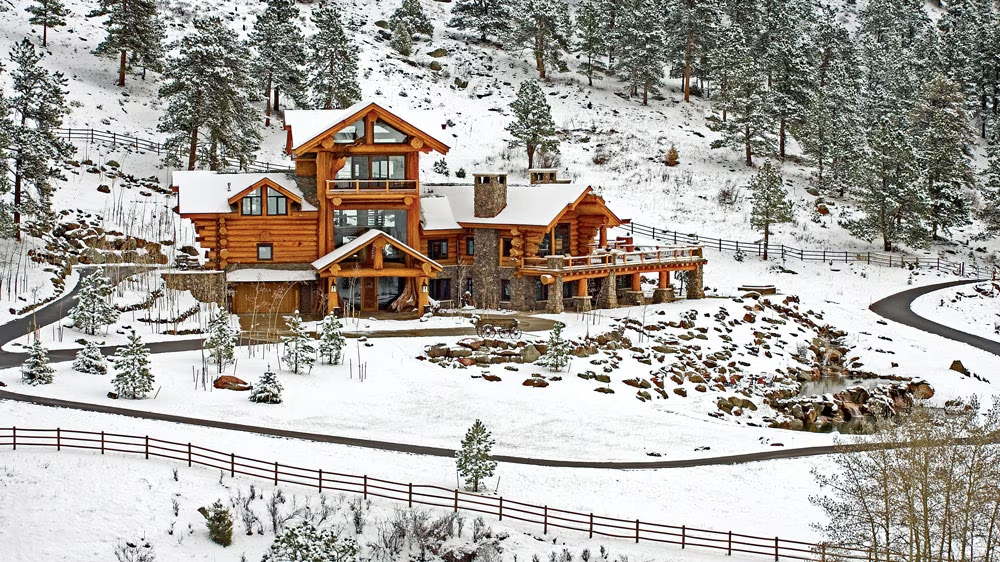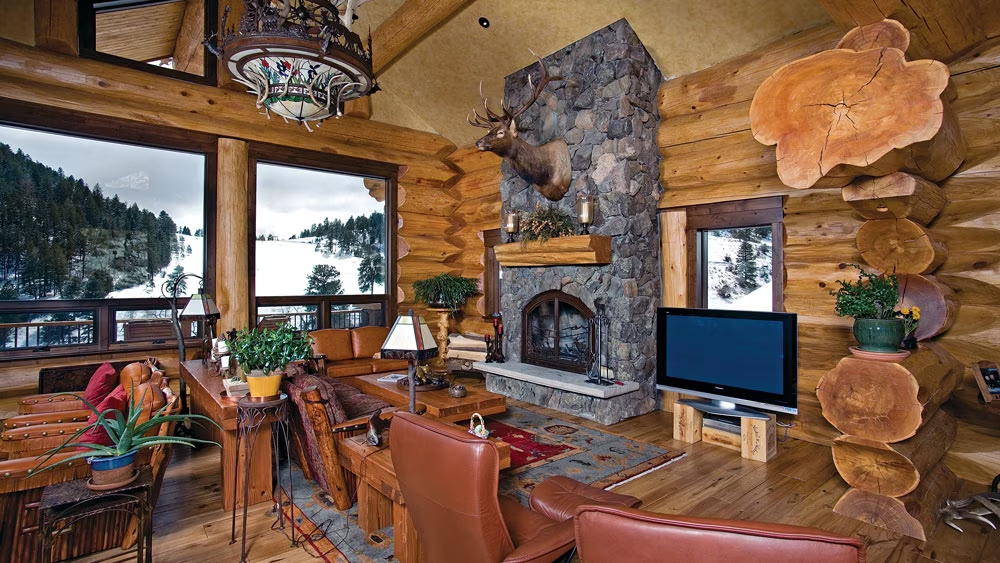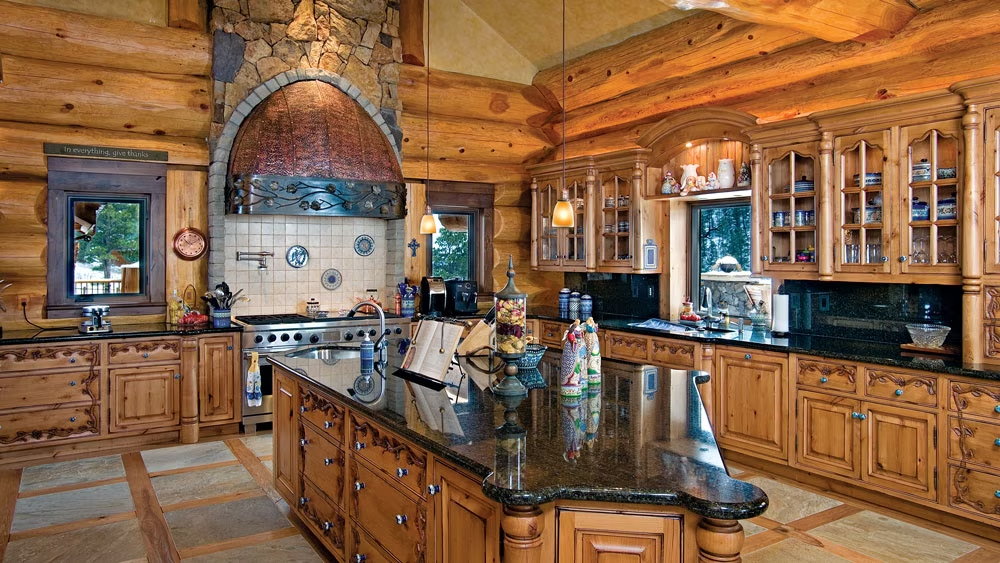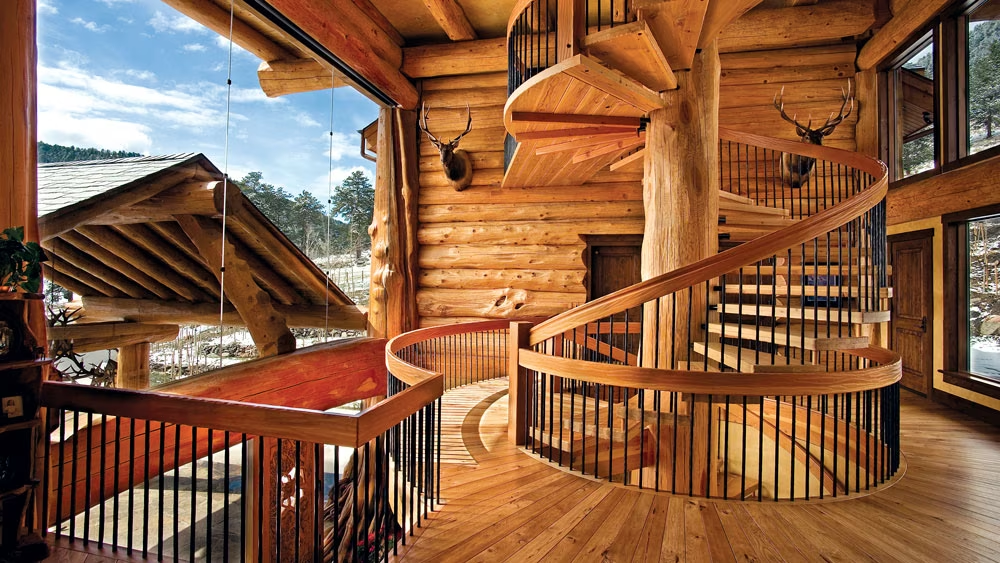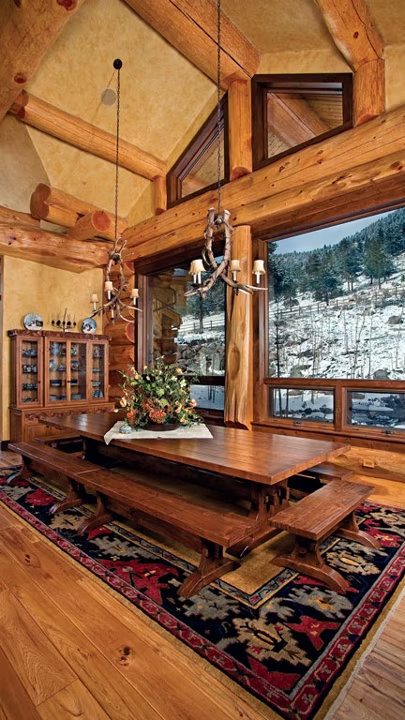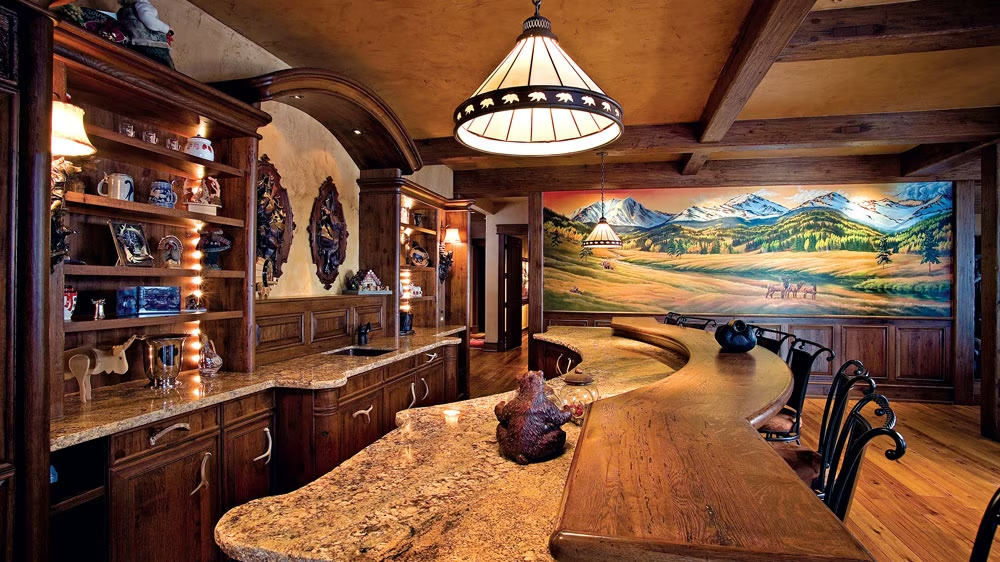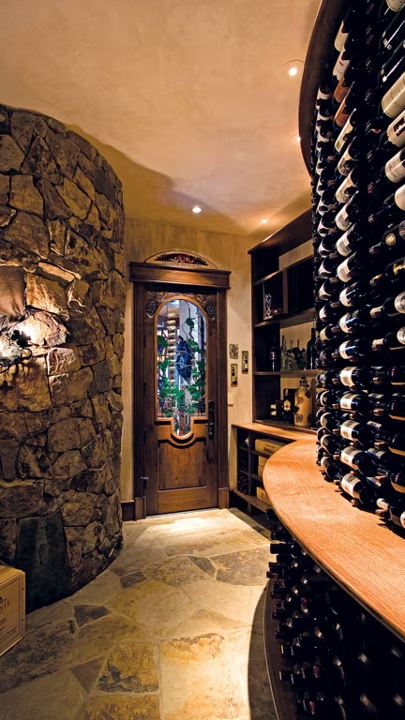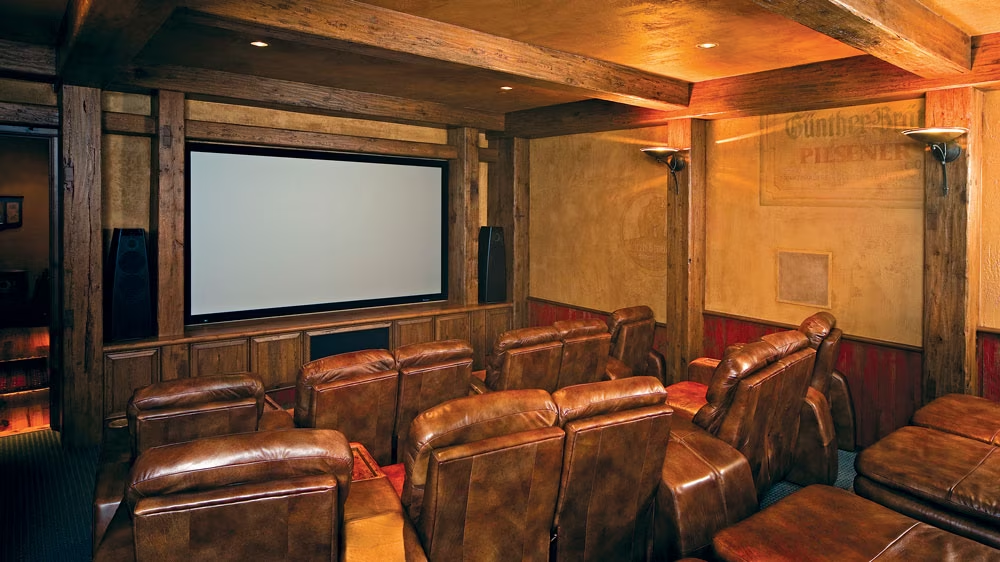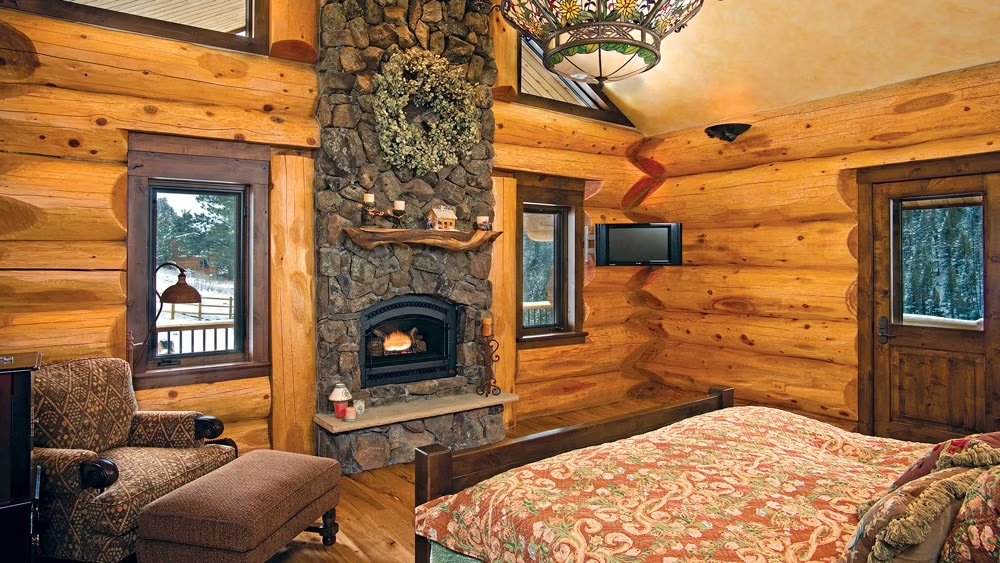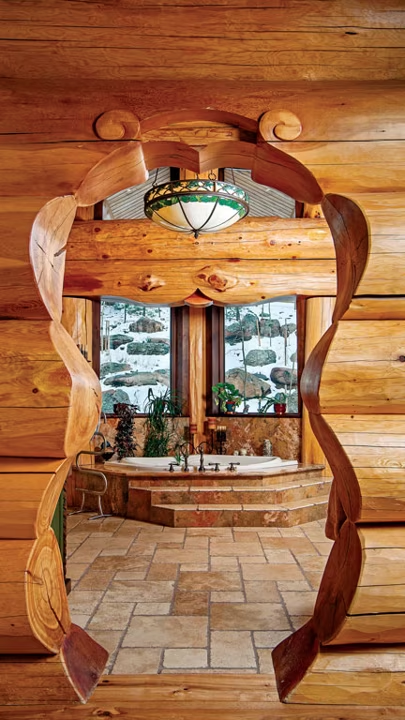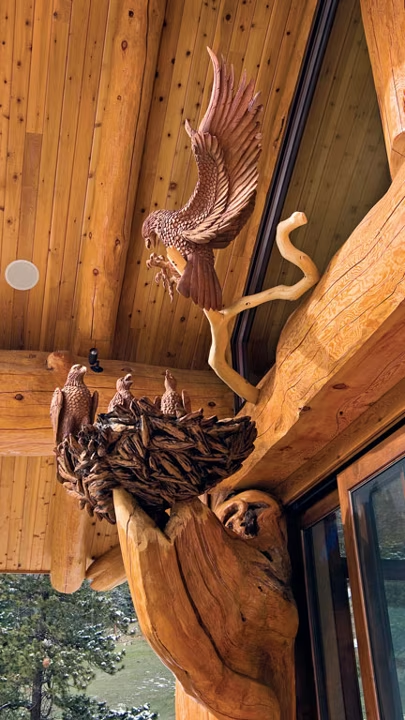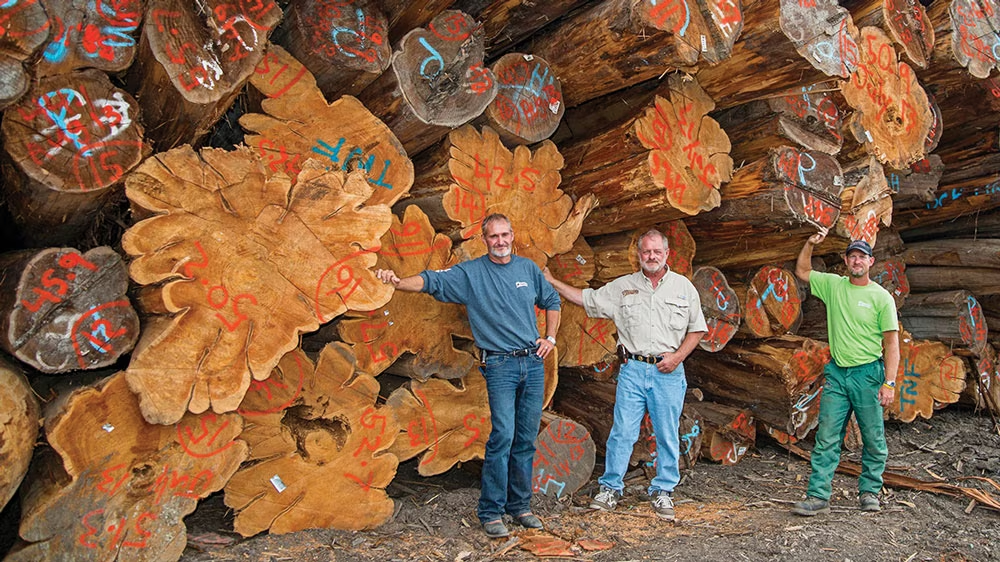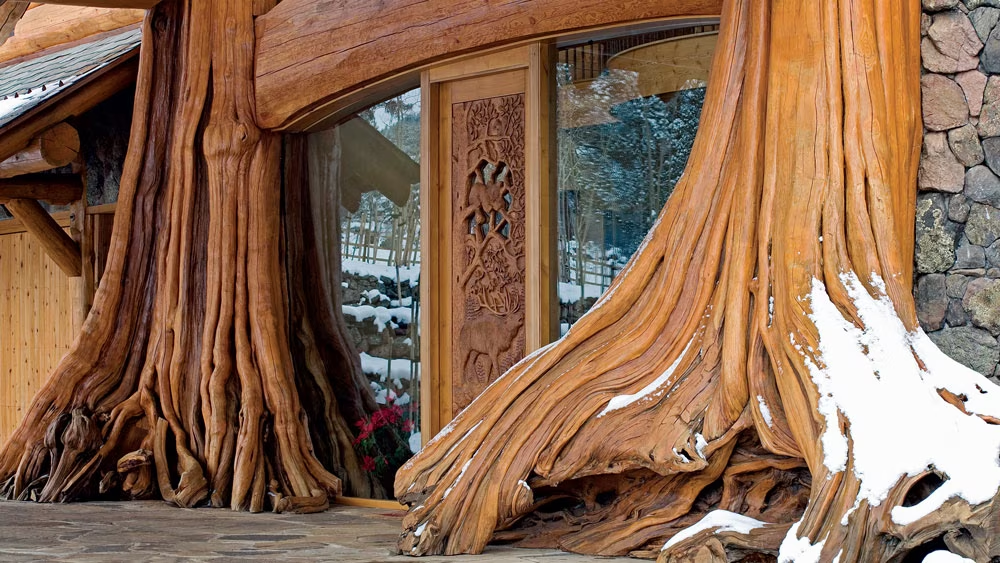Gunter and Gloria Preuss set high expectations for their log home. “I’m passionate about wood,” says Gunter, a third-generation cabinetmaker, “and I’m passionate about perfection in wood,” Their Colorado home proves his point. The logs add an exclamation mark. “Once we saw these big logs,” Gloria says, “there was no turning back.”
The couple’s story begins when they bought land that had an old 900-square-foot log cabin already on it. “It was pretty crude. It had no electricity and barely running water,” Gloria recalls. “But we fixed it up and lived in it for nine years.”
Most of that time, they spent planning how to make the cabin bigger. They’d imagined their design all the way up to 7,000 square feet by the time Gunter took a fishing trip to British Columbia and spotted a log yard with the biggest logs he’d ever seen. After he got home, he and Gloria went to a log-home show in Denver looking for more ideas to upsize their cabin. They ran into André Chevigny, general manager of Pioneer Log Homes of British Columbia, the company that Gunter had visited on his fishing trip, and invited him to come see their property and expansion plans. “As soon as I saw this magnificent property,” Chevigny recalls, “I told them to forget about expanding. They should start over from scratch.”
They didn’t need much convincing. After deciding to move the cabin and build where it had stood, because that spot had the best views and protection from mountain winds, the Preusses began designing the new home. It was a true team effort, involving the homeowners, Pioneer’s designers in Canada and Boulder architect Kathy Scott.
Scott had worked on plans for the cabin makeover and knew their wishes. They included main living areas all on one level, room for entertaining on the lower and an observation tower for Gunter’s office. “We’re basically kitchen people,” Gunter says, indicating that despite the home’s size, he and Gloria live pretty much in the great room, kitchen and master bedroom — the same areas they occupied in the original cabin. “But we wanted to be able to entertain 20 to 30 people.”
They also wanted a guest bedroom on the same level as the master, an office and exercise room for Gloria, and an outdoor fireplace and eating area because they’d seen them in a log-home magazine. “We collected files of pictures to get ideas,” Gloria says.
They were satisfied by the finished layout but surprised by its size. “We thought the 7,000 square feet we’d figured for the cabin expansion was too big,” Gloria recalls. “The next thing we knew, we were looking at 10,000 square feet.” (Actually, 10,929 square feet, distributed on two levels and the 2,000-square-foot pop-up tower.)
After Scott finished the layout, Pioneer’s designers, led by Don Gesigner, who visited the site to understand its aspects, made the plan possible to be built from logs and worked out the details for interior and exterior logwork. The engineering was especially crucial because of the size and scope of the logs, the home’s complicated roofline and the need to distribute mass and incorporate glass.
What’s noteworthy isn’t the size of the home, but its scale. The handcrafted western red cedar wall logs average 22 inches in diameter. Character posts and beams are even thicker, highlighted by two tree-size pillars that flank the front door. It opens to the entry, whose stairs spiral around a 53-foot-tall log post.
Pioneer cut and fit the logs at its yard, then took them apart, loaded them onto 13 tractor-trailers (including separate ones for each of the 40,000-pound entry posts) and shipped them to the States. The delivery charge was just shy of $80,000.
The trucks arrived one at a time to unload logs as they were scheduled to be stacked, but after each one unloaded, there was no room to turn around. A crane had to lift and rotate them. Pioneer’s crew, led by Peter Arnold and Bryan Reid Sr., set the log shell, then turned the work over to local builder Tanner Custom Carpentry. Because Gunter and Gloria already lived on the property, they acted as their own general contractors.
The couple also finished all interior wood surfaces. “Gunter made everything in this house,” Gloria boasts. “He made the doors, he made the floors, the trim around the windows, the cabinets, even the dining table and hutch.” He also fashioned the treads for the staircase. Local artists contributed carvings, murals and other artistic embellishments. To make the logs stand out even more, Gunter and Gloria hired a lighting designer to highlight the logs, especially the corners.
Gloria bought most of the furniture on buying trips, primarily to Cody, Wyoming, where she stocked up on large-scale, Western-style items. “Gunter told me I had no budget,” she recalls, “but when I was done, he said I went over it.”
The Preusses surrounded their house with rocks and water, creating a rugged landscape that further emphasizes the drama of the logs. Gunter calls the home “the anchor” of their land, but insists that it’s about quality, not size. “If you plan well, maybe you don’t need 10,000 square feet or 5,000,” he explains. “Maybe you can figure out how to do a 3,000-square-foot home and keep the same quality level.”
Conceding that he and Gloria don’t use the home’s extra space often — “but when we do, it’s nice to have it” — Gunter insists that even if they downsized, they’d build with the same big logs as this home. “They’re perfection,” he says. “We couldn’t settle for less.”
Timber Kings
The big logs with flared butts that distinguish Gunter and Gloria Preuss’s home look spectacular, but they’re typical of what Pioneer Log Homes of British Columbia provides. “We buy our logs a year in advance” Pioneer GM André Chevigny explains, “and ask the loggers and fallers to cut them as low to the ground as possible to save the roots as big as they can at the base of the tree. The way I look at it is we’re saving trees that would otherwise be cut up for lumber and displaying them in a house that’s going to stand for 300 years.”
The western red cedar wall logs are stockpiled to dry. Once needed, they’re de-barked and scribe-fit (bottom of one log cut to match the contour of the top of the one below it) at the company’s yard in Williams Lake, some 300 miles north of Vancouver. Pioneer typically carves embellishments to the log ends, usually an animal or bird.
For special uses, such as those at the entrance of Gunter and Gloria’s house (shown in the gallery above), Pioneer cuts down 10 to 15 big trees a year, drills to make sure they’re sound and then keeps them at the company’s yard until needed. “They’re harvested by digging around the roots with an excavator, then cutting off at the roots and pushing the trees over to keep the root ball intact,” Chevigny explains. He points out that the twin pillars for the Preuss place had been stockpiled for six or seven years before Gunter saw them and said he wanted them in his house.
Home Details
Square Footage: 10,929
Bedrooms: 4
Baths: 4.5
Log Provider: Pioneer Log Homes of British Columbia
Designer: Kathy Scott and Pioneer Log Homes
Builder: Tanner Custom Carpentry
Landscaper: Rocky Mountain Hydroscapes




